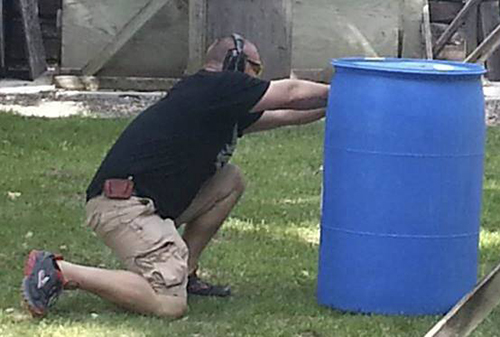A while ago a friend of mine sent me an email asking what type of firearm she should consider for home defense. I was a bit surprised by this request because we had never had a conversation about firearms or self-defense, but I continued reading her email. The night before an intoxicated male entered her house around 2am while she was home alone. The windows and doors were open to let the house cool off, it had been a warm day, but was a very nice evening. Her husband works odd hours and was at work. She heard the screen door open and close, wondering if her husband had come home for some reason. The person did not say anything to her and she became suspicious. She turned off a few lights and peeked out of the bedroom, where she had been reading a book. She saw a man standing outside the porch on the front steps. She quickly ran to the living room, closed and locked the door and shut off the lights. She wasn’t sure what else to do, so she called her husband at work. When I spoke with her about her decision to call her husband, she said that she was very scared at this point and that was the only thing she could think to do. Since her husband works very close to home, he jumped in a truck and drove home immediately. The suspect had stolen a pillow off the couch and curled up in the bushes to fall asleep. Her husband and his co-worker confronted the man who wasn’t able to answer many questions; he wasn’t even sure of where he lived. They said he smelled like alcohol, but he must have been on drugs too. They told him to go home and let him go; he wandered off.
I asked why they did not call the police. They said he was just a drunk college kid and they didn’t want him to get into trouble. We discussed where he might have gone, if he entered someone else’s house and scared them, if he stepped into traffic and got hit by a car, if he fell into a body of water and drown, or he if ran into a less forgiving crowd and got beat up / seriously injured. They said they hadn’t thought about those things.
We discussed why they felt a gun was the right idea. Having been a firearms instructor for 15 years, I have my own reasons and thoughts on the subject, but I wanted to hear their ideas. She said she was scared and thought a pistol would help her feel a little safer. Her husband said it would allow her to protect herself. I asked why she didn’t call the police when she realized this man had entered her house. She said he was probably just a drunk college kid and she did not want him to get into trouble. I drew the distinction and cautioned them on “labeling” problems. First I pointed out that shooting him would put him in more jeopardy than calling the police, she agreed. I pointed how he had gone from a “potentially violent intruder” to “just a drunk college kid” in the same brief discussion. Our conversation illustrated the importance of simply taking the facts at hand and trying to NOT rationalize, irrational behavior.
I explained how dangerous it could be to either the subject or to you to try to rationalize their behavior / actions. For instance, years ago another friend arrived home one morning after working an extra shift, arriving at his house around 4:30am, he saw a strange man, he’d never seen before, walk from his neighbor’s house to a van that was parked on the street with a large bag, enter the van, exit the van and walk to his front door, entering the porch. My friend worked as a security guard and immediately thought the person was committing thefts, he ran to his front door, shouted at the individual who reached into the bag, my friend drew his pistol and challenged the subject. The subjected screamed at my friend that he was delivering newspapers. My friend forgot that his roommate had recently subscribed to the sunday paper. His assumption that this was a burglary led to him drawing a gun on a paper delivery man!! That’s a tough one to justify. Needless to say, the paper man called the police and my buddy had to explain himself to the police and learn a tough lesson. It would have been just as easy for my friend to call the police, report the license plate number of the van, and let the police handle the situation or at the very least, maintain distance, not rush in, and make verbal contact at a distance to avoid creating a situation where a physical assault could occur.
The point here is that while a firearm may “make someone feel safe“, its the ability to think rationally, and weld that firearm with wisdom and skill that actually makes someone “safe” (or at least safer than without it). Please remember that a firearm is just a tool, having a gun doesn’t make a person into a gunfighter anymore than having a hammer makes someone a carpenter. Training and practice are necessary. Please don’t trick yourself into simply “owning” the gun, learn to shoot it well, and learn to defend yourself properly.

